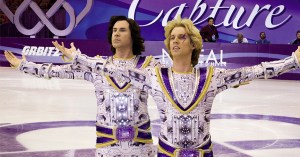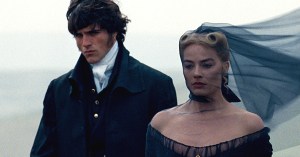The 10 Best Movies Ever Released on Christmas Day
Most of us won't be going to the theater after Christmas dinner this year, but we've gotten some pretty amazing films in the past that opened on the 25th.

(Photo by Warner Bros. Pictures, ©2020 Disney/Pixar)
For some, December 25th movie releases have traditionally offered an escape from uncomfortable family time while providing theater employees a chance to make that sweet holiday pay. Most of us won’t be heading to cineplexes on Christmas Day this year, though, due to the ongoing COVID-19 pandemic and the widespread business closures associated with it. Like a lot of things in 2020, it’s an unprecedented situation, and movie lovers looking for something to pass the time will instead likely turn to HBO Max’s Wonder Woman 1984 or Disney+’s Soul to fill that gap. All of this got us thinking about the movies of Christmas Past, and we thought it might be both fun and enlightening to look back at every film ever released on December 25th and try to figure out if one rises above all the rest.
One might understandably assume the list would be littered with holiday classics, but since they’re typically released earlier than, you know, Christmas Day, we ended up with a hodgepodge of just about anything you could imagine. Considering they include titles as diverse as Magnum Force, Tombstone, An American Werewolf in Paris, and that most celebrated of yuletide standards, 47 Ronin, it’s clear that there isn’t any rhyme or reason to Christmas Day releases beyond “Let’s cross our fingers and hope this makes a lot of money.”

(Photo by Frank Connor/©Universal Pictures)
Before we jump in, though, we need to clarify a few things about the process. First, our data set includes films that received wide releases on December 25th and have Tomatometers, Audience Scores, and reliable box office numbers. Regarding the latter, we had to stick to domestic box office earnings due to reliability issues with global market totals. Unfortunately, this meant older films like There Was a Crooked Man and Friday Foster failed to make the cut due to incomplete or insufficient data. Once we collected the relevant information, we ranked all the movies by Tomatometer, Audience Score, and Domestic Box Office (adjusted for inflation), added up their ranking numbers, and arranged the results in descending order so that the film with the lowest rank total would take the top spot. We know; it’s a lot to digest.
With the logistics out of the way, let’s get to why you’re here. After compiling all the statistics and ranking all 124 movies we looked at, we were able to narrow the list down to a Top 10. Will the top spot go to a bloody revisionist Western, an all-timer heist flick, or a stylish take on a legendary sleuth? Check out the full list below, along with each film’s rank in our three data categories and a little bit of context, to find out which one is the Best Movie Released on December 25th!
10. Tombstone (1993) – 50 Points

(Photo by ©Buena Vista Pictures courtesy Everett Collection)
Tomatometer Score (Rank): 74% (21st)
Audience Score (Rank): 94% (4th)
Domestic Box Office (Rank): $125 million (25th)
While we have no evidence of this, it’s safe to assume that many adults would’ve been O.K. to receive tickets from Santa to go watch Tombstone when it was released on December 25, 1993. The thought of watching legendary lawman Wyatt Earp (Kurt Russell) go to war against an outlaw gang of red-sashed murderers, led by Powers Boothe and Michael Biehn, is simply too epic to pass up. Not only was Tombstone a hit in 1993, but it’s grown in stature since then as its memorable mustachioed characters, epic gun fights, and iconic lines (“I’m your Huckleberry”) have become more and more popular. It also doesn’t hurt that the cast also includes – deep breath – Val Kilmer, Bill Paxton, Sam Elliott, Billy Zane, Michael Rooker, Charlton Heston, Stephen Lang, Thomas Haden Church, Billy Bob Thornton, and Dana Delaney, and they’re all excellent. Tombstone is a rollicking good time, and despite some behind-the-scenes friction and director swaps, it’s still a fan favorite that boasts an outstanding 94% Audience Score.
It’s tough to single out the best moment, as the movie features a plethora of memorable scenes. Whether it’s Wyatt Earp’s takedown of a bully (Billy Bob Thornton in a fun cameo) or Doc Holliday’s “I’m your Huckleberry” right before he puts one in Johnny Ringo’s forehead, Tombstone has a deep bench of epic moments and characters, which is why it’s on our list.
9. Sherlock Holmes (2009) – 49 Points (Tie)

(Photo by Alex Bailey/©Warner Bros. courtesy Everett Collection)
Tomatometer Score (Rank): 69% (25th)
Audience Score (Rank): 77% (20th)
Domestic Box Office (Rank): $250 million (4th)
Riding high off the success of 2008’s Iron Man, Robert Downey Jr. stepped into the well-worn shoes of another famous brilliant person, Sherlock Holmes. The end result was an intriguing modern-day update of the character created by Arthur Conan Doyle in 1887. Rather than simply using his brain, Holmes uses his brawn as well, engaging in underground fist fights that showcase his six-pack abs and uncanny ability to anticipate his foe’s moves, which allows him to exert maximum pain on his bare-knuckle boxing opponent (is that cheating?).The Guy Ritchie-directed film about Sherlock’s hunt for an aristocratic serial killer would go on to collect $524 million worldwide and spawn a sequel two years later, Sherlock Holmes: A Game of Shadows, which also cleared the $500 million mark at the global box office.
Fans and critics alike were fairly impressed with the performances by A-listers Downey, Jude Law, Rachel McAdams, and Mark Strong, as well as the stylized directing of Ritchie, which breathed new life into an old character. We’re even scheduled to get a third entry in the franchise in December of 2021.
9. Magnum Force (1973) – 49 Points (Tie)

(Photo by Everett Collection)
Tomatometer Score (Rank): 72% (23rd)
Audience Score (Rank): 77% (20th)
Domestic Box Office (Rank): $211 million (6th)
As the second entry in the five-film Dirty Harry franchise, Magnum Force had the luxury of trading on the blockbuster success of its predecessor, but it also carried the expectations of the popular film that featured San Francisco Police Department Inspector Harry Callahan (Clint Eastwood) asking people if they felt lucky. Focusing on Harry’s hunt for corrupt cops who take the law into their own hands, Magnum Force features explosions, murder, blood, profanity, and more explosions – you know, typical holiday movie stuff – which thrilled 1973 audiences who were looking for all of those things. Director Ted Post, who also worked with Eastwood on the well-received 1968 Western Hang ‘em High, knew what he was doing (making an action sequel), and there is no better evidence of that than in the opening credits: the cast and crew list is played over Harry’s .44 Magnum gun, which he then points towards the screen and shoots (think American James Bond) in a bonkers breaking of the fourth wall that tells the audience immediately what they’re in for.
7. Broadcast News (1987) – 48 Points

(Photo by ©20th Century Fox Film Corp.)
Tomatometer Score (Rank): 98% (2nd)
Audience Score (Rank): 79% (18th)
Domestic Box Office (Rank): $116 million (28th)
Written and directed by James L. Brooks, the workplace comedy Broadcast News was nominated for seven Academy Awards and is considered to be one of the greatest movies ever about journalism. Holly Hunter, William Hurt, and Albert Brooks all received Oscar nominations for their lively performances, and it would be tough to find a more likable and well-written comedy about three people who love/hate making television together. Hunter famously joined the project shortly before production started, and she’s so good you’d think Brooks wrote the role just for her. Also, if you’ve never watched Broadcast News, go ahead and check out Aaron’s (Albert Brooks) sweating scene; it’s an uncomfortable moment that features an excellent reporter absolutely bombing on camera, and Brooks plays it to perfection. Glancing at the reviews, you’ll see the phrases “uproariously funny,” “warm and heartfelt,” and “enormously entertaining” pop up time after time, and for good reason. Broadcast News gave audiences a lot to cheer for on December 25, 1987.
6. The Aviator (2004) – 47 Points

(Photo by Warner Bros. Pictures)
Tomatometer Score (Rank): 86% (11th)
Audience Score (Rank): 79% (18th)
Domestic Box Office (Rank): $147 million (18th)
Directed by Martin Scorsese, and starring Leonardo DiCaprio, Cate Blanchett (who won a Best Supporting Actress Oscar), and Kate Beckinsale, among others, The Aviator focuses on the early life of director/aviator/entrepreneur Howard Hughes and his legendary antics. Much like Hughes, The Aviator is larger than life as Scorsese loads it with glamour, plane crashes, and excellent visual effects that blend seamlessly into the period setting. The Aviator was the second (of the now five) collaborations between DiCaprio and Scorsese, and it netted DiCaprio his first Best Actor Academy Award nomination (he was previously nominated for Best Supporting Actor for What’s Eating Gilbert Grape); it also happens to be the first of three – yes, three – appearances on this list by Leonardo DiCaprio. The $110 million-budgeted drama won five Oscars (of a total 11 nominations) and still holds up beautifully, as the work of editor Thelma Schoomaker and cinematographer Robert Richardson give the 170-minute biopic an epic feel.
5. Little Women (2019) – 42 Points

(Photo by Sony Pictures)
Tomatometer Score (Rank): 95% (5th)
Audience Score (Rank): 92% (6th)
Domestic Box Office (Rank): $108 million (31st)
Powered by Greta Gerwig’s Academy Award-nominated script and direction, the $40 million-budgeted Little Women pulled in $216 million worldwide and was met with near universal praise. The feat is all the more impressive (and not altogether unexpected, since Gerwig loves the novel) considering Louisa May Alcott’s iconic story about sisters growing up in Massachusetts during the civil war has been adapted for the screen multiple times, dating all the way back to 1917. What makes this adaptation stand out among the rest is the way Gerwig includes a nonlinear storyline and a different ending to offer audiences something fresh and unexpected. Also, bringing back her Lady Bird star Saoirise Ronan to play the pivotal role of Jo March was a smart idea, as the two work wonderfully together, and Ronan received Academy Award nominations for both films. Plus, Gerwig didn’t stop with Ronan; she and producer Amy Pascal also landed the immense talents of Meryl Streep, Florence Pugh (who received a Best Supporting Actress nomination), Emma Watson, Laura Dern, Timothée Chalamet, and a host of other incredible actors, lending the film the kind of A-list shimmer you’d expect to see in a prestige picture.
4. To Kill A Mockingbird (1962) – 30 Points

(Photo by Everett Collection)
Tomatometer Score (Rank): 92% (7th)
Audience Score (Rank): 92% (6th)
Domestic Box Office (Rank): $148 million (17th)
Since its release in 1960, Harper Lee’s Pulitzer Prize-winning novel To Kill a Mockingbird has been an American institution that has sold over 40 million copies and been discussed and re-evaluated in classrooms across the country. Two years after its publication, director Robert Mulligan brought To Kill a Mockingbird to the big screen, and it was a smash hit that won three Academy Awards and eventually earned the 25th spot on the American Film Institute’s Top 100 Films list. Anchored by Gregory Peck’s Oscar-winning performance and Horton Foote’s faithful screenplay, Mockingbird tells the story of Atticus Finch (Peck), a lawyer in the depression-era South defending a Black man named Tom Robinson (Brock Peters) who has been put on trial for an undeserved rape conviction.
Putting aside the important cultural discussion that continues to this day, To Kill a Mockingbird is an example of a book adaptation done right. Mulligan and Foote knew they had excellent source material to work from, so they stuck to it (mostly), and with the help of Harper Lee presented a faithful adaptation that struck a chord with audiences who saw the movie as a gift when it opened on Christmas Day of 1962.
3. Django Unchained (2012) – 28 Points

(Photo by Andrew Cooper/©Weinstein Company)
Tomatometer Score (Rank): 87% (10th)
Audience Score (Rank): 91% (7th)
Domestic Box Office (Rank): $191 million (9th)
Between Four Rooms, Jackie Brown, and The Hateful Eight, Quentin Tarantino sure loves releasing movies on December 25, but his biggest Christmas Day hit came from Django Unchained, a super R-rated revisionist Western featuring a final gunfight that leaves a Mississippi plantation estate flooded with blood. The movie pulled in a whopping $15 million its opening day (Catch Me If You Can only pulled in $9 million) and ended up earning $191 million domestic, winning Academy Awards for Tarantino (Best Original Screenplay) and Christoph Waltz (who won his second Best Supporting Actor Oscar after earning his first for another Tarantino collaboration, Inglourious Basterds).
Django Unchained tells the story of a freed slave named Django (Jamie Foxx) who teams up with an eccentric German bounty hunter named Dr. King Shultz (Waltz) in exchange for Shultz’s help freeing Django’s wife Broomhilda (Kerry Washington) from the vile clutches of plantation owner Calvin Candy (Leonardo DiCaprio, making his second appearance on this list). Normally, hard R-rated exploitation films with 165-minute running times wouldn’t be nominated for five Academy Awards (and win two). Yet under Tarantino’s supervision, Django delighted audiences around the world and provided Christmas counterprogramming with silver-tongued devils, flesh-ripping torture, and Leo DiCaprio monologuing about skulls.
2. Catch Me If You Can (2002) – 15 Points

(Photo by ©DreamWorks courtesy Everett Collection)
Tomatometer Score (Rank): 96% (4th)
Audience Score (Rank): 89% (9th)
Domestic Box Office (Rank): $257 million (2nd)
It wasn’t a hard sell to get audiences into theaters to watch Catch Me If You Can in 2002. Directed by Steven Spielberg and starring Tom Hanks and Leonardo DiCaprio (and that makes three!), Catch Me If You Can is a rollicking film about Frank W. Abagnale Jr. (DiCaprio), a likable con man being chased around the world by Carl Hanratty (Hanks), a likable FBI agent who really wants to, well, catch him. During the globe-trotting caper, we also get to spend time with the very likable Frank Abigaile Sr., played by Christopher Walken, whose performance was so warm and welcoming he received an Academy Award nomination for Best Supporting Actor.
We’re not trying to be reductive about how “likable” the movie is, either. The expertise of Spielberg, the skill of his cast, and the Oscar-nominated score by John Williams make this 141-minute film fly by faster than a Pan Am airliner. Its appeal to people of all ages can’t be argued because it’s the rare film to receive nominations from the AARP, MTV, and Teen Choice Awards, which essentially makes it the Tom Hanks of movies.
1. The Sting (1973) – 10 Points

(Photo by Universal Pictures)
Tomatometer Score (Rank): 94% (6th)
Audience Score (Rank): 95% (3rd)
Domestic Box Office (Rank): $835 million (1st)
Looking to build off the blockbuster success of 1969’s Butch Cassidy and the Sundance Kid, which grossed $661 million domestically and won four Academy Awards, director George Roy Hill and stars Robert Redford and Paul Newman reteamed for The Sting. With an “if it ain’t broke, don’t fix it” mantra in place, The Sting once again showcased Redford and Newman’s unbeatable chemistry, playing lovable criminals who plan on swindling money from a shifty character played by Robert Shaw in 1930s Chicago (and hopefully avoid a freeze-framed death via a barrage of bullets). The Sting might be one of the most enjoyable films to ever to win Best Picture at the Academy Awards (it won a total of 7 Oscars from its 11 nominations). It also boasts an $835 million domestic box office haul, which would make almost any Marvel film jealous, and it’s currently the 21st highest domestic grossing film of all time. If you haven’t watched The Sting, do yourself a favor and check it out, because the A-list star power, the beautiful Oscar-winning costumes, and the charisma of Redford and Newman together are undeniable.







